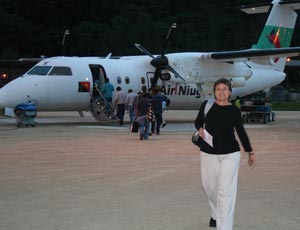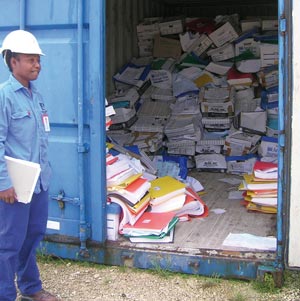Oilsearch on target with Oracle
A giant in global oil and gas exploration and development, Oilsearch is implementing the Oracle Universal Content Manager (UCM) with Oracle Universal Records Manager (URM) for document management.
Oilsearch has been operating in Papua New Guinea since 1929. Listed on the Australian and Port Moresby Stock Exchanges, Oilsearch is a $US4 billion company with around 1000 full-time staff and over 1000 contractors located in PNG, Australia, Yemen and the United Arab Emirates.

It is a partner in Exxon Mobil’s $US15 billion liquefied natural gas project in Papua New Guinea
After selecting an EDMS based on the Oracle Stellant platform, in a tender announced in late 2008, the company now has Oracle as the base for document management, the JDEdwards enterprise suite and Human Resources.
The standard desktop environment is Windows XP/Microsoft Office.
Data Management Team Lead Joy Horton was appointed along with Document & Systems Controller Kevin Foong to bring order to the company’s extensive digital and paper archives in 2005.
An oil exploration company must assemble and manage vast amounts of seismic and geological research data. Complicating matters for Joy and Kevin was the need to also incorporate data obtained through a number of corporate acquisitions.
While a large amount of company information is stored in standard Office formats, images or PDFs, exploration data resides in multi-gigabyte files that are not opened by any standard desktop application.
In this case the native document is not placed on the EDRMS, a pointer is there instead. In some cases this data is only available in paper printouts that run to many metres in length.
Paper glut
“Management wanted a way to unburden the company from the unseemly amount of paper that had built up,” said Horton.
An initial move was made in 2005 to bring paper-based records under control by implementing a library catalogue platform from Australian company Trimagic.
This consist of three integrated databases: a Technical Library which is an index to the entire collection of Oil Search technical data; a Details database for individual physical items relating to technical library resources such as boxes, Exabyte tapes, CDS and DVDs etc; and a Digital database which is an index to soft copy content stored on digital media such as CDs & DVDs.
The system offers secure editing and access via browser for the information management team. For other company personnel, search-only access is provided via the intranet linked to email for requesting items.

Horton then began the search for an electronic document management platform that would provide suitable functionality. This search has taken four years and extensive research, with assistance from consulting firm Experience Matters.
The four years were used productively creating some of the artefacts that are the backbone of a document and records management system such as the Classification schema, retention schedule and metadata model.
This required extensive external consultation across all parts of the company. The trick was to reduce what seemed complex into a simple clean model that works for everyone.
“There is a dichotomy between the way that you retrieve and index items in a library and electronic document management which incorporates version control, retention and destruction schedules and all those other things,” said Horton.
Both Trimagic and UCM are based on an Oracle platform, and the ability to implement federated search via the Oracle EDMS means Trimagic may be retained as a library platform once the EDMS is fully deployed.
“We are working on the premise that we have an awful lot of documents to manage before we start deconstructing platforms that are already working,” said Horton.
“We want to have a single point of entry with as many things in the EDRMS as feasible.”
One major challenge derives from the type of locations Oilsearch operates in internationally. The highlands of Papua New Guinea, the Congo and the Libyan desert are places where reliable power cannot be guaranteed, let alone a broadband Internet connection.
Currently there are two separate strands to document management at Oilsearch.
The Sydney head office controls the delivery of documents such as company policies, standards and forms as well as working procedures for operators working on the ground in Papua New Guinea.
“SharePoint us used within the engineering division in Brisbane to share documents with engineering partners outside our network but not across the entire company.
“That type of sharing of data across our networks is really hard because of the very low bandwidth. Its an environment that discourages sharing and collaboration,” said Horton.
One of the aims of the EDRMS initiative is to remove the silos that have evolved within the company’s separate operations in Brisbane, Sydney and Papua New Guinea, which operate separate shared folder networks.
Rather than leaping directly into an EDRMS rollout, Horton chose to spend some time developing a business classification scheme that provided a simple data structure no more than three levels deep.
Taxonomy focus
A geneticist by training, with a Masters degree in Biological Science and also a Masters in Business Administration, Joy Horton welcomed the challenge of working to develop a taxonomy for corporate data. She was assisted by specialists from Experience Matters.
“It was a definite strategy to keep navigation simple and allow people to find content by using search functions and investing in a metadata model and doing that with some rigour.”
The international oil and gas exploration industry is at varying stages of implementing EDMS platforms so it was not possible to settle on an industry standard solution. Many companies in the field are still relying on physical archives and manual processes.
The Oracle UCM/URM platform went live in Sydney in October 2009 and Oilsearch is currently testing its ability to function across the low bandwidth link to outlying posts in Papua New Guinea and elsewhere across the globe.
Horton envisions the EDMS will strengthen the company’s knowledge management and provide assistance to the technology operations.
“It cost millions of dollars to drill a hole in locations such as Papua New Guinea, so we can’t afford to be wide of the mark. Near enough is not good enough.”
“Operational excellence has been an important aspect of this EDMS project since the beginning, and I have tried to engage the company from the top.
“I would rather be condemned for being a little bit slow than getting it wrong.
“So many document management implementations fail because they haven’t invested in all the essential foundation elements and also prepared the company for change,” said Horton.
